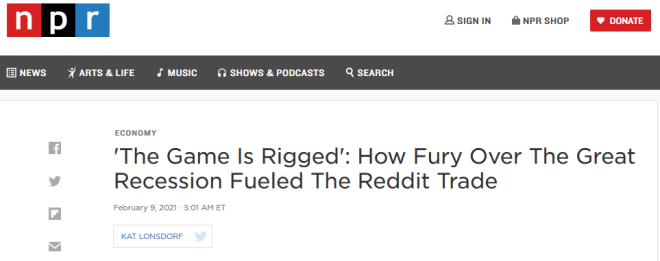You may have noticed GameStop shares in the news recently. If you’re already familiar with the situation you can skip to the next paragraph, but for those that aren’t, a very simplified summation. Wall Street is a casino. Some Hedge Funds bet that the value of GameStop shares would go down. People on reddit (an internet forum) noticed this, and organised mass buying of GameStop shares. Demand was high, so the value went up. The big traders lost money.2
What really kicked up a fuss, though, was various trading platforms (the apps a lot of these redditors were using) put restrictions on trading. The narrative became that the Wall Street fat-cats didn’t like “ordinary” people beating them at their own game, and so were (further) rigging the system. While I agree that “the odds were never in our favour”, I felt this was an incomplete explanation, and after reading an article the other day I realised why.
Like several other forms of gambling, an important factor in stockmarket success is the ability to predict other people. In poker, it’s about whether your opponent is bluffing or not. In stockmarket trading, it’s whether lots of people3 are likely to want (or not want, as the case may be) particular stocks. Most traders don’t really care if their million-dollar profit comes from one person losing a million dollars, or a million people losing one dollar.
What matters is whether everyone is playing the game with the same goal4 (making money, obviously). Many of these redditors were hoping to make a profit, but many others were explicit in that their goal was to make the Hedge Funds lose money, even if it meant they themselves lost money too. This is a fundamentally different motivation, and drives behaviour differently, making traders’ previous market knowledge and experience worthless. It’s understandable that restrictions were put in place to try and get things back to “normal”.
The whole thing also reminded me of another thing I saw recently:
I think that 12-year-old Andrew Schiavone actually has a better grasp than the adult version. The adult version would say “that’s a cheap hat, it’s not worth the time”, but (depending on the hat) the problem is actually that either the kids are being offered a low-value reward (a badly-made hat that will wear out quickly), or the person who made a quality hat is not being valued enough for their work.
Modern capitalism could stand to incorporate some different types of value, and accept that people will have different priorities.
1 Several people pooling their money in order to take advantage of trading in bulk, often using riskier tactics. They tend to restrict access to people or companies with sufficient capital.
2 As with all things in life, the actual situation is a lot more complicated than that, but the nuances of how a “short position” works, or arguments about whether either party could be considered to have manipulated the market are not germane to this discussion.
3 Your opponents, because let’s not forget, this is a zero-sum game: If you’re making money, someone else is losing money.
4 Not whether they’re playing by the rules, per se. It’s not like Wall Street is highly regulated, and persistently enforced.


